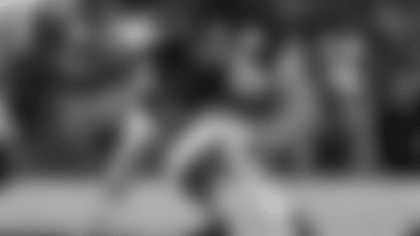Transcript of head coach Eric Mangini's news conference with the New York Jets media Monday afternoon:
While talking to the team this morning, one thing we went through, talked about and I explained it in detail, was the need to play a complete game. There is too much of one quarter of good football, one half of good football or one series of good football and then some kind of lapse. Having the Jekyll-and-Hyde approach that we've had is not going to give us the results we are looking for.
As we talked about last week in sharing the Marty Schottenheimer story, you don't know which play is going to be in that handful of plays that's going to affect the outcome of the game. You can't have the really good football, the really smart football interrupted by plays that aren't well-executed and aren't very smart. That goes to the coaching as well. It has to be consistent with the play-calling and with the game-planning across the board. We all need to be more complete on Sundays. I really like the way these guys work and the way they care about each other. The approach and the execution has to be the same throughout the whole course of the game.
On whether he anticipates any changes …
I look at things every single week. When I talk about the concept of the consistent approach, what I'm really talking about is treating each opponent the same, having the same level of work ethic and the same level of personal preparation. The one thing that is consistent about us is change. We are going to change week to week based on the opponent and do whatever gives us the best chance to win. In terms of consistency of approach, I'm speaking purely about the work ethic, the studying and the personal preparation. Consistency and what is consistent about this team is the change week in and week out to how we are going to approach that opponent.
On why they've struggled with consistency more this season …
I don't think it was completely consistent last year, either. I think there were times early in the season where we didn't get off to the start we would have liked to, and I don't think this is a problem that is unique to us. You're always looking to put together that complete game and complementary football. You see so many examples week in and week out of really well-played football. Then there's some examples where one guy isn't in the right gap, one guy misses a tackle, one guy doesn't get his block, there's one miscommunication.
That's why the core things we value are communication, focus, finish and trust. Plays where there's lack of communication and one side is doing one thing and one side is doing the other, you're going to get in trouble. If you don't finish each play and each game, you're going to get in trouble. If you're not focused play in and play out, if it's not exactly the same each time, if you can't leave what happened the play before behind, that's where issues arise. "I have to do what I'm supposed to do. If I'm supposed to set the edge, that's what I do on that play. I can't think that I'm going make a play for somebody else" because anytime someone tries to fix a problem for somebody, they create a problem with where their responsibility was supposed to be taken care of.
On if there is one consistent problem in the running game …
It's different each time and is something we're looking to improve constantly in terms of what plays we are calling. Are they the plays we want to continue to build off of? What plays don't we like? Should we completely remove them or are they things that are correctable? Is everybody blocking who they're supposed to block? Are we adjusting well to the pressures or movements? Are the backs hitting the right path? Defensively, it's the same thing. Are we fitting the proper gap? In this front, do we really understand where we fit? Where is our safety help and secondary support? You can't fix one problem and then open up another problem.
On what he sees in Thomas Jones' running game …
It's a combination of things. Again, reviewing what plays we like against that opponent, were they the right plays? Did we call them at the right time? Did we block them correctly on the front side? On the back side was the path of the back correct? Was the ball-handling correct? Thomas [Jones] and Leon [Washington] are different styles of backs. Did we adjust when Leon was in? Did we adjust when Thomas was in? It's not one clearcut answer, it's a collective answer.
On why Jones only had three carries in the second half …
It was a balance in the first half in terms of run and pass, and we really only had the one drive in the third quarter. It's not a function of trying to move away from him. You're always looking to be balanced offensively and defensively in terms of your play calls. Some situations we've been in earlier dictated that you had to go to more of a passing-type attack, but you're always looking to have balance as an offense so there can't be a run–pass key based on the situation.
On what Chad Pennington has to do to play better …
He is no different than anybody else on the team. It's some outstanding plays and some excellent plays in the pocket. I thought he had quite a few yesterday where he made some ... "outstanding" is the best word I can use. Then you have to be able to make those decisions and do the risk–reward looking at the throws and make good decisions throughout the course of the game. It does come down to a handful of plays, and you don't know which one is going to be part of that handful.
On if he was surprised by Pennington's decisions toward the end of the game…
I don't think it's unique to yesterday. I don't think it's unique to Chad. I think collectively there were decisions about going inside of a blocker instead of staying outside, looking into the backfield instead of maintaining "man eyes" — which is what we call it defensively when you're in man-to-man coverage and not getting caught up in the action in the backfield where you can cut somebody free. It's all of those things. It's got to be play in and play out throughout the course of the game.
On whether Pennington misread Aaron Ross on the interception-return TD ...
We had run that play several times throughout the course of the game, had gotten different looks and hit the play a couple times for really big yards. I thought Ross did a nice job undercutting the route, [Pennington] got it there a little bit late, but it had been a play that had worked very well and it's different each time. There's a read element to the route as well from the receiver, so it's not like the play unfolds the same way every time. It could have been run a little bit better from the receiver's perspective and could have been thrown a little bit better.
On if DBs are jumping Chad's routes because they don't respect his ability to throw deep …
I think we threw the ball vertically multiple times yesterday. We had a 7-route that probably would have hit the 5-yard line that we couldn't quite complete. The first play of game was a deep comeback. There was a play on the sideline to Laveranues [Coles] that we hit and the play to Brad Smith for the touchdown, which we hit. There were a couple other plays that we took shots on. I think one was to Justin McCareins. So I don't thing there's a definite pattern there. You're not trying to force the ball into places that it shouldn't be forced into.
On Sam Madison saying Chad throws a light ball …
You'd have to talk to Sam a little bit more about that. I know that usually after you win a game you have a lot of great keys and great things that you did. Pretty typical. You know where they're running, throwing and you know everything.
On having three sacks in five games …
I thought we pressured the quarterback multiple times yesterday. There were some times where he got out of the pocket. He had the intentional-grounding penalty, which was big because it pushed them out of field goal range. There was a play there on third down late in the game where he threw the ball quicker than I'm sure he wanted to [Jeremy] Shockey that [Andre] Dyson broke up. So some of the pressure is going to create sacks, some is going to create throwaways and some is going to create intentional grounding. There was one early in the game where he threw it right at [Derrick] Ward's feet. It's not all going to hit where you get a sack. Sometimes it's not just about the sack, it's about the throwaway and their inability to convert.
On Pennington taking the responsibility of the loss on himself …
What I really like is the way everybody on this team takes it personally. Everybody is accountable, and that's what you're looking for from a team. Each person is accountable. Players and coaches are accountable. Everybody can do things better and everybody should be disappointed. This is a group that works extremely hard, practices hard, studies hard and the results aren't what we'd like them to be. If people weren't accountable and weren't taking it personally, I think that would be much more of an issue.
On keeping the team together and not frustrated …
That's why our commitment in the draft and free agency is character. What I've always found is when you draft people of high character, you have a team of high character and when things get tough, that's when character is revealed. That's why it's such a premium. It's easy when you're winning and being successful to work hard. It's easy when things are good to stay a little bit later and study as hard as you did the first week.
When things are tough, it's tough to take the same consistent approach. That's why there is such a commitment to guys of high character here organizationally, because through the course of my career, I've seen the value of that. I've been with teams that have gone through difficult times and pressed through them. That to me, is what you're always looking for.
On if he senses frustration among his players …
Each week you pour your heart and soul into the game plan. Throughout the course of OTAs, preseason and training camp, you work extremely hard. One game isn't more disappointing than the next. You're putting in the same type of effort each week to get at that win. When those results don't come, it is disappointing. You're always working to be successful.
On if Pennington is still starting ...
Yes.
On Kellen Clemens bringing a vertical dimension to the offense …
You'd like to look at it as this is the one issue, if this issue was taken care of, then everything else would click, but it's really not the case. We struggled early with kickoff coverage and we've done a good job correcting that. Our kickoff return game wasn't what we wanted it to be and we've had two returns for touchdowns there. Turnovers — we got the turnover for a touchdown yesterday and another turnover for points there at the end of the half.
You're constantly addressing different things and it never comes down to one piece that's really going to necessarily put you over the top. You have to be able to keep the offense backed up when they're on the 2-yard line. You can't have multiple penalties that continue drives. You can't lose your gap and allow a guy to bounce out for 9 or 10 yards. You can't let their best special teams player make the tackle on the first kickoff return of the game. It's not just that one element, it's a group of things. It's giving the players the best possible scheme and making sure throughout the course of the week they either understand the scheme or you eliminate the scheme. It's collective.
On if he is worried that the team is inconsistent …
There's not one player or coach that I don't have complete faith in — if that weren't the case, they wouldn't be here. And I like the way we approach things, I believe in the way we approach things and the work ethic that comes with this group of guys, this organization and this coaching staff. That's how problems are solved, is by recognizing them, correcting them, applying those corrections, and the answer lies within the room.
On if he feels his team is getting his message or if it needs to be backed up with a win …
We spend a lot of time watching the tape of the previous game, the games we've had and practice. And when you see all the positive things on tape, it's easy to understand what that hard work translates into and what the potential is if you continue to work the way we've worked. There's plenty of evidence on tape that's very positive. It's a constant effort and every team in the NFL is building on the mistakes and learning from the mistakes, because unfortunately those are the best teachers. You'd like to play mistake-free, but the key thing is seeing mistakes and learning from them.
On if Antonio Pierce and the Giants picked up on Pennington's verbal signals …
You'd have to talk to Antonio about that. We do quite a bit of signals that mean something and signals that mean nothing. There are some times in practice where they make a signal and I'll turn to [Brian] Schottenheimer and say, "What play is that?" He'll say, "That's the dummy call." It's just something that they changed in the quarterback meeting prior to going to practice. So if it's changing enough to where I could potentially be fooled at practice, I'd like to think that maybe he's got a better bead on it than I do.














